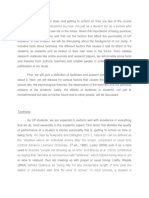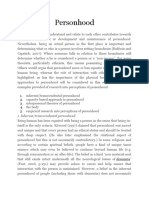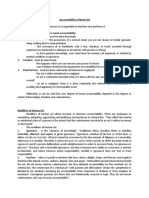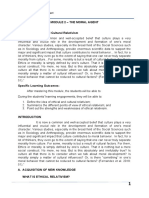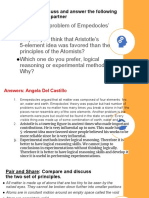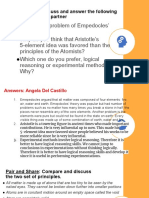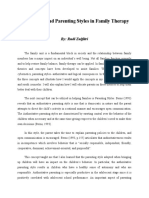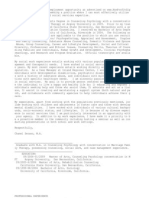Professional Documents
Culture Documents
Ethics - Chapter 3 Arguments & Critical Evaluation
Ethics - Chapter 3 Arguments & Critical Evaluation
Uploaded by
Angela Del CastilloOriginal Description:
Original Title
Copyright
Available Formats
Share this document
Did you find this document useful?
Is this content inappropriate?
Report this DocumentCopyright:
Available Formats
Ethics - Chapter 3 Arguments & Critical Evaluation
Ethics - Chapter 3 Arguments & Critical Evaluation
Uploaded by
Angela Del CastilloCopyright:
Available Formats
Arguments for Ethical Relativism
There are quite a good number of reasons for believing and
accepting that what Ethical Relativism holds is true. In what
follows, we will present the most commonly mentioned reasons or
arguments, which in one way or the other favor and support the
belief in the philosophy of Ethical Relativism.
1. The Cultural Differences Argument
One of the most often cited reasons to support Ethical
Relativism is the actual existence of moral diversity among
cultures. Throughout history many societies have held beliefs and
practices about morality that are strikingly different from our own.
For centuries, people have pointed out those different societies
or cultures at least appear to have vastly different moral codes (See
Barcalow 1998:48-49; Curd 1992:171; De Castro 1995:127-130;
Montemayor 1985:6; Pojman 1999:28-29).
Indeed, it is uncontroversially true that people in different
societies have different customs and different ideas about
right/good and wrong/bad. There is no universal or transcultural
consensus on which actions are right and wrong, “even though
there is a considerable overlapping with regards to this”
(Warburton 1995: 56-60).
Noted American anthropologist Ruth Benedict (1887-1948), a
pioneering scholar in the field, in her book Patterns of Culture
(first published in 1935), claims that “careful study of the cultural
practices of different peoples supports the idea that what is and is
not behaviorally normal is culturally determined.”
Thus, “acquaintance with the wide diversity of moral beliefs
across societies” may lead us to deny that there really is only one
correct moral code that applies to and binds all societies (Barcalow
1998:48).
The indisputable reality of cultural diversity has been
tremendously influential; it has persuaded a lot of people to adopt a
skeptical stance as to the whole idea of an objective and universal
moral truth (Curd 1992:99). Given the wide disparities of practice
and belief, it seems that Ethical Relativism is consistent with the
facts of cultural diversity.
2. The Argument from Respect
As we have just noted above, Ethical Relativism rooted in
cultural multiplicity seemed to be very appealing to a good number
of people, especially among the youth of today. “Part of its
[powerful drawing power] is due to the fact that such view has
been thought to promote tolerance” (Timothy & Wong 1996:14).
Accordingly, if moral codes differ from culture and there is no
objective or culturally dependent basis by which to judge the moral
code of any culture, then the moral code of one’s particular culture
has no special status compared with the rest.
Moreover, “[no culture] has the right to impose [its] own
[ethical] views [and practices] on anyone else, least of all on
people in different cultures [and traditions]” (Timothy & Wong
1996:14). The appropriate attitude to take is therefore one of
respect and tolerance for moral standpoints different from what
one upholds (Gensler 1998:15).
Tolerance has always been considered as a virtue while taking
a superior stance is usually viewed as the height of arrogance, if
not plain narrow mindedness especially so in this postmodern
world of ours which have seen the fall of many “absolutes” in the
course of humanity’s long history.
Through Ethical Relativism, it is believed that people would
become more accepting of moralities of others, no matter how
these may be radically different from their own. People have to see
and realize that the other side of the fence is not necessarily wrong.
They have to stop this “we’re right and they’re wrong” attitude and
rather view the other as simply “different.”
3. The Psychological Argument
This argument undermines confidence in the objectivity of
ethics by making us aware of the non-rational ways in which moral
ideas and beliefs are formed and developed in the individual.
Among psychologists, there is considerable agreement about how
this happens; the picture remains remarkably constant, even when
we consider radically different psychological theories.
All these suggest a certain conclusion: Our values are simply
the result of our having been conditioned to behave in a certain
way. We may feel that certain actions are good and others are bad
or evil, but that is merely because we all had been trained and
conditioned to have those feelings, beginning when we were still
little children usually through parental rearing.
Thus, “if we have been trained and brought up by our parents
or elders differently, most certainly we would have different moral
values and principles, and we would definitely feel just as strongly
about them” (Curd 1992:99-105).
In other words, all of us human beings acquire our moral
beliefs by a process of psychological conditioning. “Thus, if we
had been conditioned differently, we would have different moral
beliefs. The conclusion becomes inevitable: our moral beliefs are
neither true nor false, right nor wrong, for there is no such thing as
objective truth in ethics” (Curd 1992:103). Moral truth is relative
to one’s own psychological upbringing, nothing more, and nothing
less.
The Psychological Argument is, without doubt, impressive.
All of us, consciously or unconsciously, have been subjected in
one way or the other, to some sort of a “psychic manipulation” by
our “Significant Others.” Hence, the argument if it is sound,
provides valid evidence that some kind of ethical relativism is true.
4. The Conformity Argument
“Some people accept Ethical Relativism because they
somehow think that people should conform with and embrace the
ethical code of their respective societies or cultures” (Barcalow
1998:54). In fact some even went as far as believing that it is their
duty to do so. As social beings by nature, it is but natural for
people to easily affiliate and conform to the accepted ethical
standards of the particular group that they belong.
Through cultural relativism, it is thought that people would
come to be more accepting of their own societal norms. Their
belief gives a good basis for a common morality within a culture –
in fact, a kind of a democratic basis where “diverse ideas
andprinciples are pooled in, thus insuring that the norms/rules that
a certain society would eventually accept have a wide and solid
support” (Gensler 1998:12). This then provides the central validity
or justification of the morality of the group, whatever it may be.
5. The Provability Argument
Finally, another reason to believe that what Ethical Relativism
holds is indeed true is the undeniable fact of moral dispute
occurring between and among groups as well as individuals.
The usual experience of people having a great difficulty in
knowing what is the morally “right thing” to do in a particular
situation has led to a general attitude of skepticism on the
possibility of determining, much worse establishing a universal
and definite moral standard (See Popkin & Stroll 1993:48-49).
The main point of contention in this line of argument is this:
“If there is such thing as objective or universal truth in ethics, we
should be able to prove that some moral opinions are true and
others false. But in fact we cannot prove which moral opinions are
true and which are false. Therefore, there is no such thing as
objective truth in ethics” (Rachels as cited in Curd 1992:101).
Critical Evaluation of Ethical
Relativism
1. On Cultural Diversity
Because of cultural diversity, many people think morality is,
just as obvious as it is relative to culture. If people differ in the
clothes they wear, the kind of food they eat and the language they
speak, why cannot they also differ in their moral beliefs? If the
former is not universal, why should morality be universal?
No doubt, there is an enormous fact of cultural diversity, and
many societies have radically different and sometimes conflicting
moral codes. Cultural relativism is indeed a sociological and
anthropological fact. And facts can never be disputed. Arguing
though that cultural relativism is an indisputable fact, “it does not
by itself establish the truth of ethical relativism” (Pojman
1999:38).
The point or rather the whole question here is this: Does the
fact of cultural relativism necessarily imply ethical relativism? Is
the fact that cultures vary in beliefs and practices tantamount to say
that there is no morally right or wrong conduct and practices in the
objective sense of the term?
Cultural diversity as a sociological and anthropological fact is
in itself neutral to making any value or moral judgment. It does not
necessarily deny the objectivity of moral values. What merely it is
saying is that cultures do vary in so many ways. It does not
categorically say whose or what culture or cultures is/are doing and
practicing what is right.
“The problem with the reasoning that morality is simply a
product of culture is that ___ a product of culture can express
objective truths. So too, a moral code be a product of culture and
yet still express objective truth about how people ought to live”
(Gensler 1998:16).
Is this not a contradiction? If morality is relative to one’s
culture, is this very statement subject also to this same relativity?
“If everything is relative, then the very truth of relativism would
also be relative” (Montemayor 1985:6).
In here, the logic of relativism self-destructs. It clearly suffers
a dose of its own medicine. In the words of a prominent Filipino
philosopher:
Ethical relativism appears to be self-contradictory and
inconsistent…. If the moral relativist insists on the legitimacy
of his view, then he/she is proposing a theory that must be
accepted by everyone… which is against what he / she is
teaching. It seems then, that one who styles oneself as a
moral relativist encounters difficulty in being self-consistent
and in acting in accordance with one’s own moral
claim….(Timbreza 1993:19)
2. On the Argument from Respect
Some people have come to accept Ethical Relativism because
they believe that people should not judge other people from other
cultures or societies on the basis of their own moral standards.
Besides, they think that this is the attitude of mature and
enlightened minds, the kind that can render respect and tolerance
in the face of something unfamiliar and even contradictory.
It is true to a point that if there is no independent way of
criticizing any other culture as what the relativists do believe, then
we ought to be tolerant of the moral beliefs and practices of others.
One of the most famous proponents of this particular position
is the anthropologist Melville Herskovits. He argues even more
explicitly than Benedict that the belief in ethical relativism entails
“intercultural tolerance” (As quoted in Pojman 1999:34).
The major contention in here seems to be that “if people think
Ethical Relativism is true, they will be more tolerant of moral
differences than they would otherwise be” (Holmes 1998:177).
Well, it is not difficult to see that if one believes that his or her
culture is not morally better than the other, he or she could likely
become more accepting of the differences of cultural beliefs and
practices. One cannot simply afford to show arrogance if one has
this certain level of consciousness.
The main question here, however is how we do really know
that this would be necessarily the case? Are we really that certain
that if one accepts the theory of Ethical Relativism, he or she
becomes automatically more tolerant and respectful of the culture
of others? Is there hard empirical evidence to support this
particular contention? Or is this just pure speculation which does
not really have the solid backing of a scientific proof?
To truly establish, beyond any iota of doubt, that belief in
Ethical Relativism necessarily translates into becoming more
tolerant of other cultures, one would have to do an actual
experimentation (in the context of a scientific rigor) of those who
claimed to embrace Ethical Relativism and find out whether these
people are in fact more tolerant than those who do not accept the
theory (See Holmes 1998:178).
Another argument against acceptance of it involves one While
tolerance is definitely consistently.
the issue on toleration is that in some sort of a contradiction. a
virtue, it cannot be practiceWhy? If morality simply is relative to
each culture, then what if the culture in question does not have
toleration as part of its moral code? This would naturally mean that
the members of that culture have no moral obligation to practice
toleration.
Not only do moral relativists offer no basis for criticizing
people who are intolerant, but they also cannot criticize anyone
who espouses what they might regard as a brutal practice, like
Hitler’s genocidal policy during the Second World War.
Moreover, to take the position of the relativists with regard to
moral standards and principles is to court disaster. Allowing every
individual or group to set their own standard as a gesture of respect
and tolerance will most likely lead to eventual conflict and
disorder, what with numerous existing standards. In this scenario,
it is likely that the law of the jungle where “might is always right”
prevails (Ardales 1987:98).
Finally, we might insist that tolerance is either not always
good or always a virtue. A lot of people would argue that tolerance
should be tempered with a sense of outrage in the face of extreme
evil.
3. On the Psychological Argument
As what we have discussed, the Psychological Argument is
undoubtedly very impressive. Hence, if it is proven to be logically
sound, it will definitely add to the file of arguments stacked in
favor of Ethical Relativism. However, as Rachels systematically
points out in the article Moral Skepticism (See Curd 1992:99-104),
the Psychological Argument contains a serious flaw.
According to him, “even granting that the truth of the premise,
that we do acquire our moral beliefs by a process like the one
psychologists described, the conclusion that if we had been
conditioned differently, we would have different moral beliefs,
thus, there’s no such thing as objective moral truth, does not
follow, hence unsound and invalid” (cited in Curd 1992).
He notes that the argument is transparently fallacious.
It is not because the premises are false. The premises are in
fact true: we do acquire many of our early beliefs…through
a system of positive and negative reinforcements. The
argument is fallacious because, even if the premises true, the
skeptical conclusion does not follow from them. The question
of how we acquire our beliefs is logically independent of,
and separate from, the question of whether there are
objective facts to which those beliefs correspond. (As quoted
in Curd 1992:103)
Obviously, how one acquires one’s belief does not necessarily
undermine its truthfulness or validity. The Psychological
Argument is indeed guilty of committing the so-called genetic
fallacy. Just because something comes from a dubious source, it
(one’s belief) does not necessarily follow that it is false or
erroneous.
Moreover, the Psychological Argument is guilty of another
(though not so obvious) mistake. It is guilty of the fallacy of
misrepresentation. It simply overstates its case.
It tries (though not good enough as we are about to see) to
deceive us into believing that the matter of social
conditioning/training is all that there is in the person’s moral or
ethical development. It fails to give due consideration to other,
perhaps equally powerful if not more powerful and significant
factors that have contributed, in one way or the other, to a greater
or lesser extent, to the formation and building of the individual’s
sense of morality.
One of the most important and crucial of all these other factors
(in fact for the Existentialist philosophers this is the most
important, if not the sole element) is the exercise of the person’s
freedom of choice or free will.
This implies that the person’s morality is a primary function of
his/her own free volition. What one is ___ is nothing but a result of
the decisions that he/she constantly makes. The human person then
becomes the sole creator of his/her values, nothing more and
nothing less. One’s moral development or formation, therefore, is
entirely a matter of decision, not condition.
This last counterpoint to the Psychological Argument paints
an extreme picture to the whole scenario. We may not be solely
and mainly (again, this one is also very much debatable) the
product of our childhood conditioning but, to disregard totally the
specific role that our early psychological upbringing played in the
formation of our moral values and behavior, is also committing the
fallacy of oversimplification.
4. On the Argument from Conformity
I think that of all the arguments forwarded in defense of
Ethical Relativism, the Argument from Conformity is seemingly
the easiest to destroy and annihilate. Let me state a couple of
reasons why.
First, according to one form of Ethical Relativism (i.e.,
conventionalism), whatever a society believes to be right is right
for that particular society.
What is considered as “good” is what the majority, as the
major constitution of a society, approves or acknowledges as good.
Likewise, what the majority says as “bad” is bad. Thus, morality is
simply dependent of what the majority wants or decides. What is
good and bad is reducible to a kind of social contract or a matter of
group consensus.
The obvious problem with this view is that it makes the
majority as the only true and legitimate voice of what is moral or
not. It is them that makes or decides what is good and bad. Ergo, it
reduces the minority to the side of falsehood or error. “For when
we talk about the moral code or ethical beliefs of a society, it
would only mean the moral code or the moral beliefs and stand of
the majority in a society” (Barcalow 1998:56).
To say for instance that a society believes that abortion is
immoral, simply means that that majority of the members of that
particular society believe that the act in question is immoral. If a
society believes that slavery is right, that simply means that the
majority of the people in that society believe that it is right.
The logical implication of this is very clear and somewhat
terrifying: The majority is always right! They can never be wrong!
This claim has terrible consequences that perhaps most of us find
too difficult to accept.
Try to imagine a group that believes and accepts racial
superiority (the Aryan race during Hitler’s time easily comes to
mind) as morally right, then it (the majority’s belief) is morally
right. If a society judges infanticide (as ancient Greek and some
other primitive cultures once believed) as morally acceptable, then
it is morally acceptable.
If the argument from conformity is valid, then, all that we
have to do is to take the word of the majority as gospel truth or
some kind of a dogma and be assured that we are already in the
right. We should just openly accept and embrace what the majority
of our society had come to accept and embrace, and that would
save us from the risk of falling into the pit of erroneous moral
judgment. But most of us know (are we guilty here of the fallacy of
the majority?) that the majority is not always right. We know for a
fact that the minority can also be correct in moral matters.
We just have to take a serious look at history to see the
presence of the so-called moral reformers (or rebels if you wish).
The list is quite long: Socrates, Mahatma Gandhi, Martin Luther
King, Jr., to name a few. If the majority is always right, then all
these and the many other moral reformists are simply wrong.
Another problem confronting the argument from conformity is
the undeniable reality of subgroups. Again, according to ethical
relativism, whether a person’s moral beliefs and claims are true,
depends on what is approved and accepted by the majority in that
person’s society or group (cultural or whatever).
The issue here is “how can one define the boundary or scope
of what really constitutes a group?” In reality, people belong to
numerous subgroups. One can be a member of a religious group, a
fraternity or sorority, a professional group, an ethnic group, a peer
group, and many more.
Clearly, the argument from conformity has ignored the
subgroup problem (See Gensler 1998:14-15; Pojman 1999:35;
Warburton 1995:61). People can belong to overlapping societies or
groups. In fact we all do.
What makes matters worse is that, some of these groups do
not only overlap but at times also conflict with one another. It
would be easy if we all belong to a single homogenous group.
However, the world is not like that. Instead, our world is a diverse
mixture of overlapping groups and communities, and people do not
always adhere to the rule of the majority. “The world is a lot more
complicated than that. We are all multicultural to some extent”
(Gensler 1998:15).
5. On the Provability Argument
Its plausibility mainly hangs on how strict and rigid we should
take the whole question of “proof” in matters pertaining to
morality (See Barcalow 199:63). If we take proof as we ordinarily
construe it to be in day-to-day, “normal” conversation, then we
would venture to say that moral issues can be “proved.” But if we
take it to mean “proof” in the standard scientific sense, then, we
would say otherwise.
The fact that human beings disagree with each other on certain
fundamental issues, is nothing but just common occurrence. “But
unlike the disputes between scientists about the age of the universe
or the constitution of matter, which can be settled in principle
through the empirical method of observation and experimentation,
ethical disputes seem to be far from being resolved” (Curd
1992:171-172).
One will only think of perennial moral issues which have not
been settled with finality like euthanasia, abortion, divorce,
homosexuality, capital punishment and the like. Far from seeing
the definite end of the various disagreements and conflicts
regarding the morality behind all these, they instead continually
bother and confuse us even more.
Thus, the conclusion that morality can never be proved seems
to be a logical necessity. One will only have to try to “prove” one’s
ethical viewpoint to another to find out how difficult and
frustrating the entire activity is.
However, if we really follow more carefully the
aforementioned argument, we can see that it contains some
objectionable features. First, let us examine the contention that
ethical issues are complex and difficult to determine.
Granting, for the sake of argument, that indeed we are
uncertain about the morality of some of our actions and decisions,
and cannot really “prove” them beyond any reasonable doubt. This
does not mean that it has no answer whatsoever. “Even if there
You might also like
- Be Your Best Self - Rebekah BallaghDocument12 pagesBe Your Best Self - Rebekah BallaghAllen & Unwin0% (1)
- The Secret Life of Movies Schizophrenic and Shamanic Journeys in American Cinema (2009) Jason HorsleyDocument300 pagesThe Secret Life of Movies Schizophrenic and Shamanic Journeys in American Cinema (2009) Jason HorsleyBrendea Alex75% (4)
- Getting To The Highest Level Conscience Based Moral DecisionsDocument7 pagesGetting To The Highest Level Conscience Based Moral DecisionsJoriz CajemeNo ratings yet
- Reflection On Magpakailanman's Episode Entitled: "My Teacher, My Rapist"Document2 pagesReflection On Magpakailanman's Episode Entitled: "My Teacher, My Rapist"Rd DavidNo ratings yet
- Lesson I. Morality and The Foundational Moral PrincipleDocument2 pagesLesson I. Morality and The Foundational Moral PrincipleDarlene Dacanay David0% (1)
- Our Lesson On Human ActsDocument13 pagesOur Lesson On Human ActsNicole100% (2)
- The Substitution Factor Rackets and Real FeelingsDocument7 pagesThe Substitution Factor Rackets and Real FeelingsМиленаВукчевићNo ratings yet
- Unit 1 - Individual Assignment-Leadership Style - SPDocument3 pagesUnit 1 - Individual Assignment-Leadership Style - SPSaurabh PuthranNo ratings yet
- Being Always Present in Class and Getting To School On Time Are Two of The Crucial Determining Factors of A StudentDocument8 pagesBeing Always Present in Class and Getting To School On Time Are Two of The Crucial Determining Factors of A StudentKristine SanchezNo ratings yet
- Make A List / Organized List: Presented By: Janet Roxan Yabo, Monnette Briones, Joulson Dave Saile, Johanna PadillaDocument21 pagesMake A List / Organized List: Presented By: Janet Roxan Yabo, Monnette Briones, Joulson Dave Saile, Johanna PadillaSapphire Yabo100% (1)
- Education and Achievement of Jose RizalDocument26 pagesEducation and Achievement of Jose RizalDJ Free MusicNo ratings yet
- ETHICS+ Module 1 CompleteDocument33 pagesETHICS+ Module 1 CompletePhilip James LopezNo ratings yet
- Sample Answer:: A. EvaluationDocument2 pagesSample Answer:: A. EvaluationDiana Fe C. FilpinoNo ratings yet
- Ethics 2Document6 pagesEthics 2ram0% (1)
- 5 The Ethics of Sentiment Reason and CourageDocument34 pages5 The Ethics of Sentiment Reason and CourageArmiee Infinite50% (2)
- Chapter 1-The Ethical Dimension of Human ExistenceDocument13 pagesChapter 1-The Ethical Dimension of Human ExistenceMyla Hababag50% (2)
- Ethics Reviwer Midterm Exam.Document7 pagesEthics Reviwer Midterm Exam.Mary MAy MatabangNo ratings yet
- Ethics-1 3Document20 pagesEthics-1 3Roriel Hernandez BenamirNo ratings yet
- Ethics Module 4 New FinalDocument11 pagesEthics Module 4 New FinalShane Kian100% (1)
- Chapter 6 - Synthesis - Making Informed DecisionsDocument2 pagesChapter 6 - Synthesis - Making Informed Decisionsddddddaaaaeeee100% (3)
- Questions For ReflectionDocument1 pageQuestions For ReflectionFernand ClaudNo ratings yet
- Three Specific Elements or Determinants of Morality (Autosaved)Document28 pagesThree Specific Elements or Determinants of Morality (Autosaved)Hazel Jane EsclamadaNo ratings yet
- Cdelarosa Ethics Week9Document8 pagesCdelarosa Ethics Week9Joshua Urbana DaganNo ratings yet
- EthicsDocument15 pagesEthicsStephieNo ratings yet
- St. Peter Baptist College Foundation Bachelor of Secondary Education (Bsed) Ge 8 - EthicsDocument1 pageSt. Peter Baptist College Foundation Bachelor of Secondary Education (Bsed) Ge 8 - EthicsVicente M. Santelices100% (2)
- Natural IntegrationDocument5 pagesNatural IntegrationNiña Amato50% (2)
- GerondaDocument4 pagesGerondaMary Ann Geronda100% (2)
- Universal Values Discussion and ExplanationDocument5 pagesUniversal Values Discussion and ExplanationAsteria TimeNo ratings yet
- Dela Cruz and Chan EthicsDocument4 pagesDela Cruz and Chan EthicsPrecilla Dela CruzNo ratings yet
- EthicsDocument2 pagesEthicsJammilaKateDakayNo ratings yet
- Inherent/transcendental PersonhoodDocument10 pagesInherent/transcendental PersonhoodJo Honey HugoNo ratings yet
- BSCpE-2B - Edano Lemuel - Final Term Module OutputDocument8 pagesBSCpE-2B - Edano Lemuel - Final Term Module OutputLemuel E. Edano100% (2)
- Accountability of Moral ActDocument2 pagesAccountability of Moral Actgiezele ballatanNo ratings yet
- Q: Is Looking After The Benefit of Your Own Family Overall Other Aspects Considered As Another Form of Egoism?Document1 pageQ: Is Looking After The Benefit of Your Own Family Overall Other Aspects Considered As Another Form of Egoism?Tat MadzNo ratings yet
- Chapter 4 - DeontologyDocument2 pagesChapter 4 - DeontologyddddddaaaaeeeeNo ratings yet
- Chapter 3 The Human ActsDocument7 pagesChapter 3 The Human Actsjeanybabes solerNo ratings yet
- Module 1 Lesson 6 ClassworkDocument2 pagesModule 1 Lesson 6 ClassworkMa.Antonette DeplomaNo ratings yet
- Knowledge "Human Act Must Be Done Knowingly" Voluntarines S "It Must Be Done Voluntarily"Document2 pagesKnowledge "Human Act Must Be Done Knowingly" Voluntarines S "It Must Be Done Voluntarily"Jacob Agbo100% (2)
- Chapter 4 Nature of The SelfDocument5 pagesChapter 4 Nature of The SelfRed Tornado100% (1)
- Why Did Reggie Return The Suitcase?Document4 pagesWhy Did Reggie Return The Suitcase?James Bradley Huang100% (1)
- Chapter 5. VIRTUE ETHICSDocument14 pagesChapter 5. VIRTUE ETHICSNobelyn FabitoNo ratings yet
- The ActDocument6 pagesThe ActTorres Andrea100% (1)
- Do You Really Know Yourself?Document64 pagesDo You Really Know Yourself?Angela Martires100% (2)
- Week 8 REASON AND IMPARTIALITY AS REQUIREMENTS FOR ETHICSDocument3 pagesWeek 8 REASON AND IMPARTIALITY AS REQUIREMENTS FOR ETHICSKristine Joy Dungganon100% (1)
- Good Manners and Right Conduct: Instructor: Ms. Leah O. ViajanteDocument12 pagesGood Manners and Right Conduct: Instructor: Ms. Leah O. ViajanteJulhayda FernandoNo ratings yet
- Philippine HistoryDocument4 pagesPhilippine Historyvern javierNo ratings yet
- End of Human Act: Let Us Check!Document8 pagesEnd of Human Act: Let Us Check!kiranNo ratings yet
- JeshDocument6 pagesJeshJeshloed Lanzaderas100% (2)
- Module 1 (Activity 2 and 3)Document9 pagesModule 1 (Activity 2 and 3)CrishNo ratings yet
- Why Can't All Cultural Practices Be CorrectDocument9 pagesWhy Can't All Cultural Practices Be CorrectJazmin Jade Escolano100% (4)
- The Stages of Moral DevelopmentDocument4 pagesThe Stages of Moral Developmentgiezele ballatanNo ratings yet
- Ge-Gs Lesson 4Document1 pageGe-Gs Lesson 4Hannah camille DitchonNo ratings yet
- Cultural Relativis M: Why Is It Not Tenable in Ethics?Document5 pagesCultural Relativis M: Why Is It Not Tenable in Ethics?Faith Gabito0% (1)
- GROUP 4 Reason and Impartially As Minimum Requirements For MoralityDocument19 pagesGROUP 4 Reason and Impartially As Minimum Requirements For MoralityArt russelNo ratings yet
- Conclusion - Ethics Through Thick and Thin, and Ethics and ReligionDocument4 pagesConclusion - Ethics Through Thick and Thin, and Ethics and ReligionJOHN PATRICK GARCIANo ratings yet
- Ethics Prefinal ModuleDocument35 pagesEthics Prefinal ModulekingNo ratings yet
- Chapter 8 The Determinants of Morality MergedDocument24 pagesChapter 8 The Determinants of Morality MergedChristian Allen Kyle MoralesNo ratings yet
- Love and Justice FrameworkDocument2 pagesLove and Justice FrameworkChristine Alderama MurilloNo ratings yet
- DocumentDocument2 pagesDocumentEmmanuel Cafirma Rivera100% (1)
- Mother Ignacia Del Espiritu SantoDocument15 pagesMother Ignacia Del Espiritu Santosunflower100% (1)
- Preliminary Activity: Society" of Dresser (1996)Document2 pagesPreliminary Activity: Society" of Dresser (1996)Son Celorico DYNo ratings yet
- Reflection Paper About Cultural RelativismDocument1 pageReflection Paper About Cultural RelativismJoven IntiaNo ratings yet
- DocumentDocument19 pagesDocumentAngel vyne borbonNo ratings yet
- Chapter 3Document5 pagesChapter 3ARTECHE, JEAN NOELLENo ratings yet
- 2nd Ethical and Cultural Relativism M2L1Document8 pages2nd Ethical and Cultural Relativism M2L1JamNo ratings yet
- Checklist For VsDocument2 pagesChecklist For VsAngela Del CastilloNo ratings yet
- 2F MOLINA Physical AssessmentDocument12 pages2F MOLINA Physical AssessmentAngela Del CastilloNo ratings yet
- High Risk PreschoolerDocument7 pagesHigh Risk PreschoolerAngela Del CastilloNo ratings yet
- High Risk NewbornDocument8 pagesHigh Risk NewbornAngela Del CastilloNo ratings yet
- Del Castillo Reading EndometriosisDocument5 pagesDel Castillo Reading EndometriosisAngela Del CastilloNo ratings yet
- High Risk Schoolage HandoutsDocument7 pagesHigh Risk Schoolage HandoutsAngela Del CastilloNo ratings yet
- Philosophy 200: Ethics: Pursue AvoidDocument9 pagesPhilosophy 200: Ethics: Pursue AvoidAngela Del CastilloNo ratings yet
- Chapter 2 - 1Document36 pagesChapter 2 - 1Angela Del CastilloNo ratings yet
- Ethics - MoralityDocument5 pagesEthics - MoralityAngela Del CastilloNo ratings yet
- Chapter One: ETHICS: Its Meaning, Nature and ScopeDocument25 pagesChapter One: ETHICS: Its Meaning, Nature and ScopeAngela Del CastilloNo ratings yet
- G5 - Del Castillo CAPRDocument3 pagesG5 - Del Castillo CAPRAngela Del Castillo100% (1)
- Pair and Share: Discuss and Answer The Following Questions With Your PartnerDocument4 pagesPair and Share: Discuss and Answer The Following Questions With Your PartnerAngela Del CastilloNo ratings yet
- Name: Angela Del Castillo Date: September 01, 2020 Grade and Section: 12 - TemperanceDocument3 pagesName: Angela Del Castillo Date: September 01, 2020 Grade and Section: 12 - TemperanceAngela Del CastilloNo ratings yet
- G5 - Del Castillo CAPRDocument3 pagesG5 - Del Castillo CAPRAngela Del Castillo100% (1)
- Pair and Share: Discuss and Answer The Following Questions With Your PartnerDocument4 pagesPair and Share: Discuss and Answer The Following Questions With Your PartnerAngela Del CastilloNo ratings yet
- Assessment of Learning 2Document39 pagesAssessment of Learning 2Jathalia VillaNo ratings yet
- H BBA H M.COM-OB ORGANIZATIONAL CONFLICT - DR - PARIMITA SINGHDocument25 pagesH BBA H M.COM-OB ORGANIZATIONAL CONFLICT - DR - PARIMITA SINGHjagdishsimariyaNo ratings yet
- Mozart EffectDocument9 pagesMozart EffectMatthew Kim P. YbañezNo ratings yet
- Why Fiction May Be Twice As True As Fact: Fiction As Cognitive and Emotional SimulationDocument17 pagesWhy Fiction May Be Twice As True As Fact: Fiction As Cognitive and Emotional SimulationchannailanaNo ratings yet
- 4 Intelligence Vs Non-IntelligenceDocument28 pages4 Intelligence Vs Non-IntelligenceSani BlackNo ratings yet
- 6th Grade 8th NotesDocument2 pages6th Grade 8th Notesapi-533580556No ratings yet
- Business Communication, Management and Success PDFDocument13 pagesBusiness Communication, Management and Success PDFriyaNo ratings yet
- AI ApplicationsDocument13 pagesAI Applicationss10_sharmaNo ratings yet
- An Integrative Model For Executive Coaching 2007Document11 pagesAn Integrative Model For Executive Coaching 2007Saimantee BhattacharyaNo ratings yet
- Cybernetics and Parenting Styles in Family Therapy: By: Rudi ZulfitriDocument3 pagesCybernetics and Parenting Styles in Family Therapy: By: Rudi ZulfitriAmalia JuaddyNo ratings yet
- Change Management Notes-1Document10 pagesChange Management Notes-1enpreet kaur aroraNo ratings yet
- AFF - Part E - Course Assessment - REVISEDDocument2 pagesAFF - Part E - Course Assessment - REVISEDEdsel LoganNo ratings yet
- A Study On Job Satisfaction of Employees in Meenachil Rubber Marketing and Processing Co-Operative Society LTD Karoor PalaDocument41 pagesA Study On Job Satisfaction of Employees in Meenachil Rubber Marketing and Processing Co-Operative Society LTD Karoor Palaannet p bennyNo ratings yet
- Parent Guide On ASDDocument8 pagesParent Guide On ASDZhareef AzharNo ratings yet
- Chapter 4 - DeontologyDocument2 pagesChapter 4 - DeontologyddddddaaaaeeeeNo ratings yet
- Social Services Case Management Therapy Behavioral HealthDocument3 pagesSocial Services Case Management Therapy Behavioral Healthapi-789585230% (1)
- DEADLINE: Week 14 Method of SubmissionDocument4 pagesDEADLINE: Week 14 Method of SubmissionnotforfreesosadNo ratings yet
- Facilitating Human Learning OriginalDocument97 pagesFacilitating Human Learning Originalsalic calimbaNo ratings yet
- Research Methods and Experimental Design: Moving Forward in Becoming A Research UniversityDocument55 pagesResearch Methods and Experimental Design: Moving Forward in Becoming A Research UniversityJoedel LelizaNo ratings yet
- Topic 2 Letter WritingDocument13 pagesTopic 2 Letter WritingAhmad Sidi100% (4)
- Diss W34Document6 pagesDiss W34monette yatanNo ratings yet
- Professional Disclosure Statement FinalDocument3 pagesProfessional Disclosure Statement Finalapi-323736335No ratings yet
- Understanding Child Development: Ages and Stages of ChildhoodDocument9 pagesUnderstanding Child Development: Ages and Stages of ChildhoodIsumi JayathilakeNo ratings yet
- Final Manage The Week StoicWeekforStudentsDocument2 pagesFinal Manage The Week StoicWeekforStudentslorenaNo ratings yet
- Literature Review 1 PDFDocument5 pagesLiterature Review 1 PDFSyai GenjNo ratings yet








